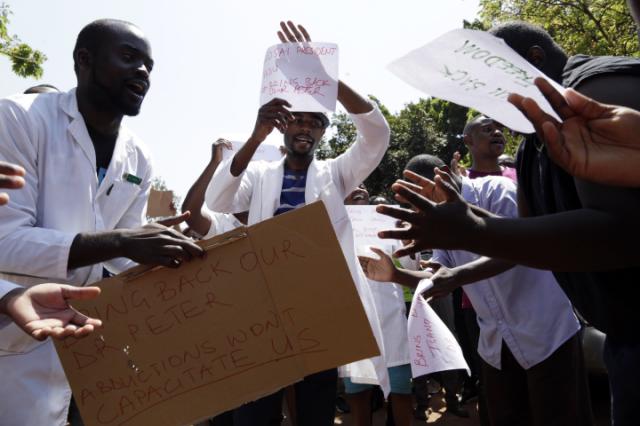A group of Zimbabwean doctors marched at the country’s biggest hospital Sunday, demanding the release of one of their leaders who they say was abducted after calling for a pay strike.
Several government critics, including a comedian and a teachers’ union leader, have in recent weeks been abducted from their homes, tortured and warned by suspected state security agents to back off from anti-government actions.
The Zimbabwe Hospital Doctors Association said its president Peter Magombeyi was abducted Saturday, days after receiving threats on his phone. It was reported as the world’s attention is on the southern African nation and the upcoming burial of former leader Robert Mugabe.
Magombeyi sent a message Saturday night alerting colleagues that three unidentified men were forcibly taking him away, said Masimba Ndoro, vice president of the association, which represents hundreds of newly qualified doctors who are doing their residencies.
“Efforts to locate him have been unsuccessful since then. We demand to know his whereabouts, we demand his release,” Ndoro said.
Police spokesman Paul Nyathi said he was yet to receive details of the case.
Magombeyi had complained of the poor state of Zimbabwe’s hospitals and staffers’ low salaries in interviews with several foreign journalists. The doctors, who earn less than $40 a month, are demanding a review of their salaries and allowances.
Zimbabwe Lawyers for Human Rights, a non-governmental group, said it filed an application with the High Court seeking an order compelling “whoever” is holding Magombeyi to release him.
Meanwhile, Health Minister Obadiah Moyo said he had engaged security agents to help locate him.
“We are alarmed by this,” Moyo said in a statement.
About two dozen doctors gathered at Parirenyatwa Hospital in the capital, Harare, where they sang and chanted slogans denouncing Magombeyi’s abduction and demanding his release.
“Abductions will not work,” read one placard. “Free Dr Magombeyi unharmed now,” demanded another and a third said “No Peter, No Negotiation.”
“Our homes and workplaces are no longer safe. We don’t know who will be taken next so we will not go to work until our safety is guaranteed. Right now, we are vulnerable,” said Tapiwa Mungofa, another of the association’s leaders.
.AP













